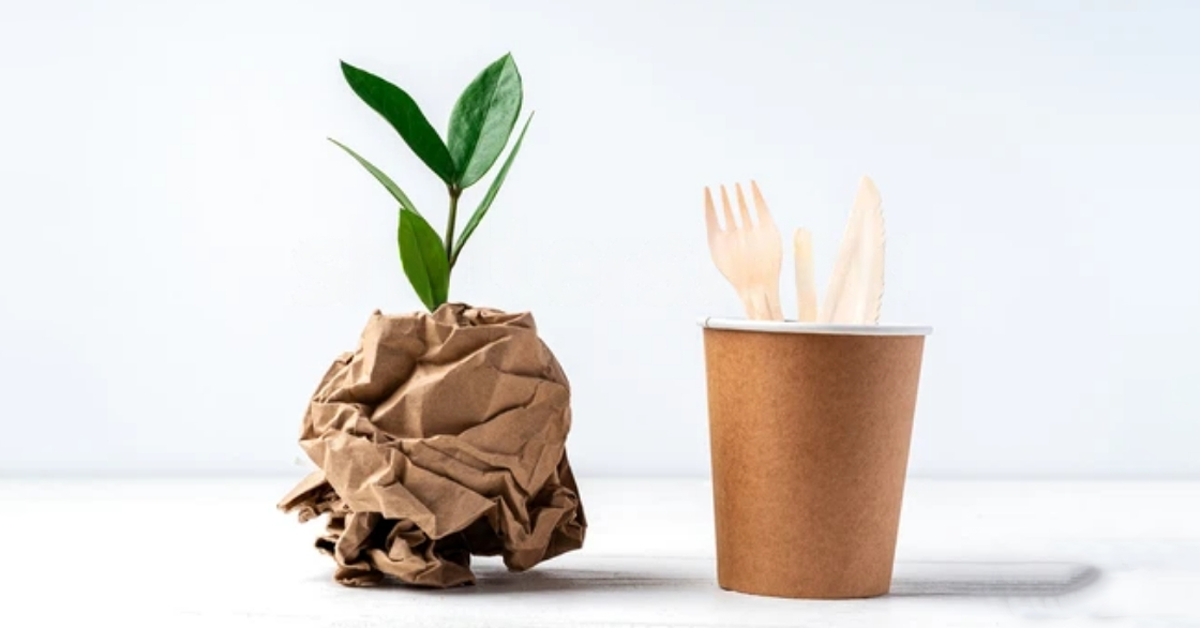Environmentalists and eco-friendly individuals argue that using paper products in the food and beverage industry can help reduce waste. Paper products, including tetra packs and coffee cups, are often regarded as easily recyclable and more environmentally friendly.
Although paper products are indeed easier to recycle, however, that may not necessarily be the case with the tetra packs and paper coffee cups that are used in the F&B industry. Tetra packs generally comprise 14% plastic sheets, 5% aluminum, 6% from a biodegradable bio-plastic cap, and 75% cardboard. On the other hand, the majority of paper coffee cups are made of 90 to 95% paper and 5% of a thin plastic coating of polyethylene, a petroleum-based product that allows the cups to be water-proof and able to hold in the liquid. The plastic sheet and coating material is difficult to separate from the paper, making it challenging to recycle these items.
Advantages and disadvantages of using tetra packs and paper coffee cups.
Using tetra packs to package liquid components such as juices, milk, and liquid tomatoes is common in the food and beverage industry. These six-layer composite packages, made of paper, aluminum, and plastic, provide efficient protection against contamination, air, and light, thereby extending the shelf life of the products. Additionally, their shape facilitates easy packing, transportation, and storage. Moreover, tetra packs are relatively cost-effective compared to other packaging options. The recyclability label on tetra packs enhances their appeal to environmentally conscious consumers.
When it comes to disposable coffee cups, the industry trend leans towards using paper cups instead of plastic or Styrofoam. This choice allows coffee shops to position themselves as proactive stakeholders in environmental protection and climate change mitigation.
However, some environmentalists question the “green” claims surrounding tetra packs and paper coffee cups. The poly aluminum mixture found in tetra packs cannot be separated, and thus can only be “down-cycled” into landfill-bound products like plastic pens and car mats. In the absence of proper recycling processes for these components, the plastic-aluminum material is often discarded into landfills. Only the cardboard portion of tetra packs can be recycled to create paper products.
As for paper coffee cups, despite being predominantly made of paper, they often end up in landfills due to various reasons. The quality of the paper combined with inner linings of wax or plastic makes recycling challenging. Furthermore, inadequate rinsing of the cups leads to contamination, rendering them unrecyclable. Dark-colored plastic coffee lids, typically indicating low-quality plastic nearing the end of its life cycle, contribute to waste. Coffee sleeves, if made entirely of paper, are the only components of coffee cups that can be truly recycled.
How the generated waste is being handled in Lebanon.
The presence of a plastic lining within tetra packs and paper coffee cups, combined with the limited availability of specialized recycling facilities in Lebanon that can effectively separate the plastic materials, poses a challenge to the recycling process.
According to a 2020 report published by ACTED, Lebanon produces a significant amount of tetra packs, totaling 140 tons per month. Unfortunately, a considerable portion of this waste is not currently recycled and ends up in landfills. While some may argue that the predominantly paper composition of tetra packs and paper coffee cups makes them less harmful to the environment, it is important to note that this waste can still undergo chemical reactions with other waste materials, resulting in the release of harmful gases into the air and contamination of the soil, polluting the land and beaches.
Value in recycling tetra packs and coffee cups
The challenge of processing waste from tetra packs and paper coffee cups should not discourage recycling efforts. These products have a relatively short life cycle and become useless once the food and beverages they contain are consumed. Moreover, considering the significant use of natural resources in their manufacturing, it is important not to waste these resources.
Recycling the paper elements and downcycling the poly aluminum components found in these products holds great value. The paper can be recycled into various new products such as writing paper and tissues, reducing the need for imports of these goods into Lebanon. Additionally, recycled paper can be used to create environmentally friendly building materials like non-load bearing masonry blocks, space dividers, thermal and sound insulators, and ceiling panels. PulP, an alumnus of the DAWERR Activity funded by the United States Agency for International Development (USAID), is a Lebanese initiative that has recognized this value and found an innovative way to partially replace cement in building blocks with recycled materials from tetra packs and paper coffee cups. “We need to invest our resources to create a better tomorrow, not only for our generation but also for our future generations,” said Hala El Balaa, Founder of PulP. She emphasized, “By using tetra packs and paper coffee cups to replace some of the cement in masonry blocks, we contribute to the reduction of CO2 emissions generated during cement production.”
The poly aluminum components found in these products can be down-cycled into single-use items such as pens, car floor mats, and flooring materials. Although these items are also single use, by repurposing them, the unavoidable waste generated from tetra packs and coffee cups can be diverted towards useful applications, preventing them from ending up in landfills and polluting the environment.
There is tremendous value in recycling materials, such as tetra packs and coffee cups. These items are often overlooked, but they can be recycled and used to create new products.
Recommendations for recycling tetra packs and coffee cups
Recycling facilities in Lebanon should take proactive measures to encourage and raise awareness about the inclusion of tetra packs and paper coffee cups in their recyclables. Guglielmo Mazzà, CEO & Co-Founder of ReFuse, a local recycling startup, stated, “Tetra packs and paper coffee cups are part of the materials we accept at our recyclables collection points in Naba’a, Hamra, Bourj Hammoud. People can receive a minimal cash reward for dropping them; however, we still don’t collect more than 100kg per month.”
As more local companies, including Balkis, LibanLait, and Dairy Khoury, adopt tetra packs for packaging their products, it becomes crucial to raise awareness not only among the general population in Lebanon but also within waste management facilities. It is important to educate people about the significance of recycling this waste and the proper methods of disposal. Simply dropping these items off at recycling facilities that accept such products is insufficient. They need to be properly rinsed to avoid contamination and rotting of the tetra packs and paper coffee cups themselves. So next time you use a tetra pack or coffee cup, remember the value of recycling them and make sure to dispose of them properly.
By recycling tetra packs and coffee cups, we can reduce our impact on the environment and create a more sustainable future.
About DAWERR
DAWERR: Diverting Waste By Encouraging Reuse And Recycling is a five-year activity funded by the United Stated Agency for International Development (USAID) that aims to improve the social, environmental, and economic well-being of Lebanese citizens by establishing sustainable solid waste recovery and diversion programs in collaboration with municipalities throughout rural areas in Lebanon.
DAWERR is implemented by ECODIT in partnership with Berytech, Compost Baladi, and ECODIT Liban.










